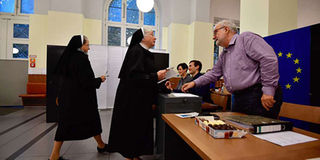Peace of Germany’s charged elections a lesson for Kenya

Nuns cast their ballots at a polling station in Berlin during general elections on September 24, 2017. Despite the politically charged times in one of Europe’s biggest economies, the election time sobriety serves up many key lessons Kenya. PHOTO | TOBIAS SCHWARZ | AFP
What you need to know:
- An outsider would be forgiven for assuming that the Berlin Marathon is the biggest news out of Germany, with local and international runners and athletics fans pushing and shoving to take selfies with the Kenyan athletes or secure autographs from the world beaters.
- For the first time since the war, a far-right party has elbowed its way into the Bundestag with the Alternative for German (AfD) having garnered 87 seats in the German parliament.
- And despite the politically charged times in one of Europe’s biggest economies, the election time sobriety serves up many key lessons for the charged, noisy and often violent Kenya process.
It is just after midday and television crews are jostling for space at Tiergarten, in the heart of Berlin, eager to grab strategic positions against the backdrop of the iconic Brandenburg Gate.
A swift change of reporting teams it is, with sports journalists — who have been covering the 44th Berlin Marathon since dawn — giving way to news crews itching to update the world on the German parliamentary elections with polls having opened in the early hours.
Kenya’s Olympic champion Eliud Kipchoge has just reclaimed the men’s title in this top race, part of the six-leg World Marathon Majors that also has races in Boston, London, Tokyo, Chicago and New York, his winning time of two hours, three minutes and 32 seconds just 36 seconds short of a new world record.
It was a Kenyan double with Gladys Cherono also reclaiming the title she won in 2015 by winning the women’s race in 2:20:25.
BIGGEST NEWS
An outsider would be forgiven for assuming that the Berlin Marathon is the biggest news out of Germany, with local and international runners and athletics fans pushing and shoving to take selfies with the Kenyan athletes or secure autographs from the world beaters.
There’s the “small matter” of the German parliamentary elections on the same day, with results trickling in signalling the most significant shift in German politics since the Second World War.
For the first time since the war, a far-right party has elbowed its way into the Bundestag with the Alternative for German (AfD) having garnered 87 seats in the German parliament.
Although Angela Merkel’s alliance of Christian Democrats (CDU) and Martin Shulz’s Social Democratic Party (SDP) has swept the chancellor back for a record-equaling fourth term, it will be Mrs Merkel’s toughest spell yet in Berlin with the arrival of AfD, a pro-Nazi, anti-immigrants and anti-Islam party that has vowed to “hunt” her down.
POLARISED TIMES
AfD maintains that refugees should be denied asylum and with their official position against Islam well known and set to be amplified in the Bundestag, Germany is indeed headed for polarised times.
On the eve of the polls, a few party faithful are seen distributing campaign literature at entrances to the subway, along with stationery and other mementos.
And on election day, save for the anti-AfD protests in downtown Berlin, the calm is a stark contract from Kenya’s noisy, insult-ridden electioneering, with hardly any posters or dirty graffiti on the German political capital’s historic walls. Just neat billboards on display.
“We need a strong position towards Europe and international challenges, and we must invest in more innovative companies,” Martin Wansleben, the former CEO at the Association of German Machine and Plant Engineering says in a televised interview as key players come to terms with AfD’s coup while tabling their wish lists.
POLICIES
“We need less bureaucracy, tax cuts, modernisation and better relations between taxpayers and the government.”
Speaking from the German financial capital of Frankfurt, Stefan Scheider, Deutsche Bank’s Chief German Economist warns that AfD’s policies could lead to xenophobic attacks.
“We can’t afford to close our borders. We must rely on our free trade policy and we need labour,” he argues as Germany faces its most splintered parliament in modern history after a vote that demonstrated the economy was certainly not the top issue for voters.
“It certainly better than the American elections,” quips a shop tender in Europa Centre, an immigrant who preferred anonymity, after the Nation sought his reaction.
SUCCEEDED
Back for a fourth term — equalling Helmut Kohl’s 16 years on office — Mrs Merkel is largely seen to have succeeded in growing the economy, but to have her way in parliament, the chancellor is now engaged in coalition talks between her CDU/CSU union, the Free Democrats and the Greens, in what has been coined as the “Jamaica coalition” because the parties’ colours (black, yellow and green) coincidentally resemble the Jamaican national flag.
In Germany, it’s common for political analysts to use colours in penning names for coalitions with “traffic lights” and “Kenya” among references used for such coalitions, alongside “Jamaica.”
And despite the politically charged times in one of Europe’s biggest economies, the election time sobriety serves up many key lessons for the charged, noisy and often violent Kenya process.
The writer is Nation Media Group’s sports editor and was in Germany to cover the Berlin Marathon on September 27




